Spring Festival春节
春节TheSpringFestival英语作文(通用31篇)
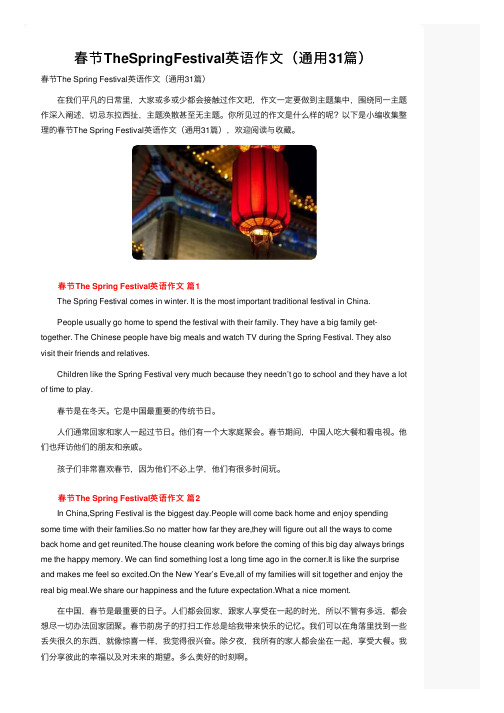
春节TheSpringFestival英语作⽂(通⽤31篇)春节The Spring Festival英语作⽂(通⽤31篇) 在我们平凡的⽇常⾥,⼤家或多或少都会接触过作⽂吧,作⽂⼀定要做到主题集中,围绕同⼀主题作深⼊阐述,切忌东拉西扯,主题涣散甚⾄⽆主题。
你所见过的作⽂是什么样的呢?以下是⼩编收集整篇),欢迎阅读与收藏。
理的春节The Spring Festival英语作⽂(通⽤31 The Spring Festival comes in winter. It is the most important traditional festival in China. People usually go home to spend the festival with their family. They have a big family get-together. The Chinese people have big meals and watch TV during the Spring Festival. They also visit their friends and relatives. Children like the Spring Festival very much because they needn’t go to school and they have a lot of time to play. 春节是在冬天。
它是中国最重要的传统节⽇。
⼈们通常回家和家⼈⼀起过节⽇。
他们有⼀个⼤家庭聚会。
春节期间,中国⼈吃⼤餐和看电视。
他们也拜访他们的朋友和亲戚。
孩⼦们⾮常喜欢春节,因为他们不必上学,他们有很多时间玩。
春节The Spring Festival英语作⽂篇2 In China,Spring Festival is the biggest day.People will come back home and enjoy spending some time with their families.So no matter how far they are,they will figure out all the ways to come back home and get reunited.The house cleaning work before the coming of this big day always brings me the happy memory. We can find something lost a long time ago in the corner.It is like the surprise and makes me feel so excited.On the New Year’s Eve,all of my families will sit together and enjoy the real big meal.We share our happiness and the future expectation.What a nice moment. 在中国,春节是最重要的⽇⼦。
外国人认为春节是SpringFestival还是Chinesenewyear?正解在这里!

外国⼈认为春节是SpringFestival还是Chinesenewyear?正解在这⾥!今天是⼤年三⼗,阖家欢乐的⽇⼦,华⼩⼀祝⼤家新年快乐!英⽂越来越好!
那外国⼈认为春节是Spring Festival还是Chinese new year呢?往下看,马上告诉你!
春节的英⽂是哪个?
Spring Festival
春节不仅仅是我们中国的传统节⽇,世界上还有很多国家过春节,⽐如韩国,⽇本,马来西
亚,越南,新加坡等,但各个国家都有⾃⼰的春节习俗。
这些国家的春节,英⽂都是Spring
Festival。
Chinese New Year
1⽉1⽇是New Year. 春节是中国特⾊的新年,所以加民族属性Chinese, 指中国的春节。
春晚,相声的英⽂?
春节联欢晚会
Chinese New Year Gala
Gala的英⽂解释是 a special performance or event to celebrate something=gala dinner 是⼀种
有吃⼜有看的⽂艺演出形式。
相声
Cross talk
外国是这么理解中国的相声的:Cross talk show in China, a pair of comedians entertains the
audience with word play.中⽂翻译过来是:相声是两个戏剧演员通过诙谐的语⾔使观众愉悦。
压轴
Grand finale
春晚的压轴节⽬《难忘今宵》(不知道今年是不是?)国外国外演出也有这样的环节,⽐如《天鹅湖》最后,每⼀幕的演员都会依次出来再跳⼀⼩段,最后全体演员上台谢幕的环节就叫grand finale。
1春节(农历一月一日)SpringFestival
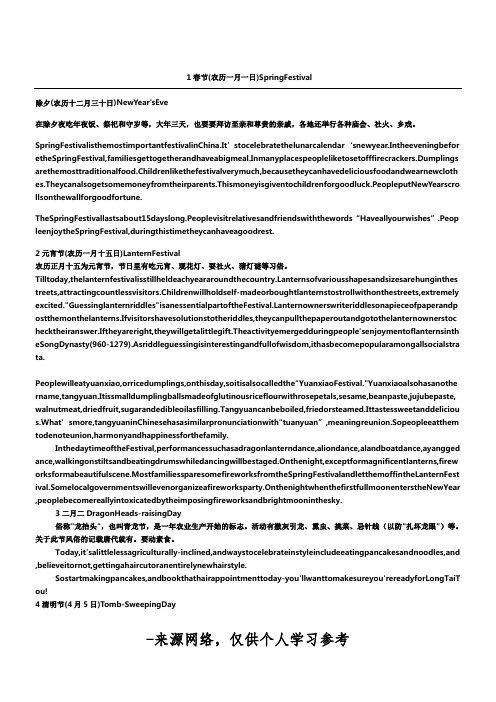
1春节(农历一月一日)SpringFestival除夕(农历十二月三十日)NewYear'sEve在除夕夜吃年夜饭、祭祀和守岁等,大年三天,也要要拜访至亲和尊贵的亲戚,各地还举行各种庙会、社火、乡戏。
SpringFestivalisthemostimportantfestivalinChina.It’stocelebratethelunarcalendar‘snewyear.Intheeveningbefor etheSpringFestival,familiesgettogetherandhaveabigmeal.Inmanyplacespeopleliketosetofffirecrackers.Dumplings arethemosttraditionalfood.Childrenlikethefestivalverymuch,becausetheycanhavedeliciousfoodandwearnewcloth es.Theycanalsogetsomemoneyfromtheirparents.Thismoneyisgiventochildrenforgoodluck.PeopleputNewYearscro2元宵节ta.3俗称"龙抬头",也叫青龙节,是一年农业生产开始的标志。
活动有撒灰引龙、熏虫、挑菜、忌针线(以防"扎坏龙眼")等。
关于此节风俗的记载唐代就有。
要动素食。
Today,it'salittlelessagriculturally-inclined,andwaystocelebrateinstyleincludeeatingpancakesandnoodles,and ,believeitornot,gettingahaircutoranentirelynewhairstyle.Sostartmakingpancakes,andbookthathairappointmenttoday-you'llwanttomakesureyou'rereadyforLongTaiT ou!4清明节(4月5日)Tomb-SweepingDay祭扫祖坟、踏青游春,忌动烟火。
Spring-Festival春节英文介绍(共32张)

On the eve of the Spring Festival,
a get-together banquet is a must, and the most popular food is Jiaozi, which is supposed to bring good fort 尘 按民间的说法:因
“尘”与“陈”谐音, 新春扫尘有“除陈布新” 的涵义,其用意是要把 一切穷运、晦气统统扫 出门。 •贴 春 联
春联也叫门对、春贴、 对联、对子、桃符等,它 以工整、对偶、简洁、精 巧的文字描绘时代背景, 抒发美好愿望,是我国特 有的文学形式。
第19页,共32页。
第13页,共32页。
[知识储备: 春节的有关 词汇] (yǒuguān)
▪ 辞旧岁
▪ bid farewell to the old year 扫房
▪ spring cleaning; general housecleaning
▪ 年糕 ▪ Nian-gao; rice cake; New Year cake
▪ traditional opera 杂耍
▪ variety show
第11页,共32页。
[知识储备: 春节的有关 词汇] (yǒuguān)
▪ 灯谜 ▪ riddles written on lanterns
▪ 灯会
▪ exhibit of lanterns ▪ 守岁
▪ staying-up
▪ 拜年 ▪ pay New Year’s call; give New Year’s greetings;
New Year’s visit
第12页,共32页。
[知识储备: 春节 的有关词汇] (Chūn Jié)
The Spring Festival春节介绍(中英文版)
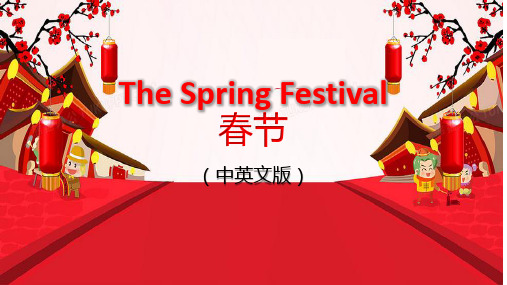
Custom
除夕之夜,全家团聚在一起 吃年夜饭,万家灯火通明,围坐 炉旁闲聊,通宵守夜,象征着团 圆,期待着新的一年吉祥如意。
On New Year's Eve, the whole family gathers together to have a New Year's Eve dinner, with all the lights on. They sit around the fireplace chatting and stay up all night, symbolizing reunion and looking forward to a prosperous new year.
The Spring Festival 春节
(中英文版)
目录
1
Origin
2
Time
3
Significance
4
Custom
春节即中国农历新年,俗称新春、新岁、岁旦等。
The Spring Festival is the Chinese Lunar New Year, commonly known as the new year, the new year, the new year's day and so on.
Origin
据记载,中国人过春节已有4 千多年的历史,它是由虞舜兴起的。
According to records, the Chinese people have celebrated the Spring Festival for more than 4000 years. It was raised by Yu Shun.
Significance
春节是我国民族的传统节日,是 中华民族文化的绘萃。
SpringFestival春节的英文介绍
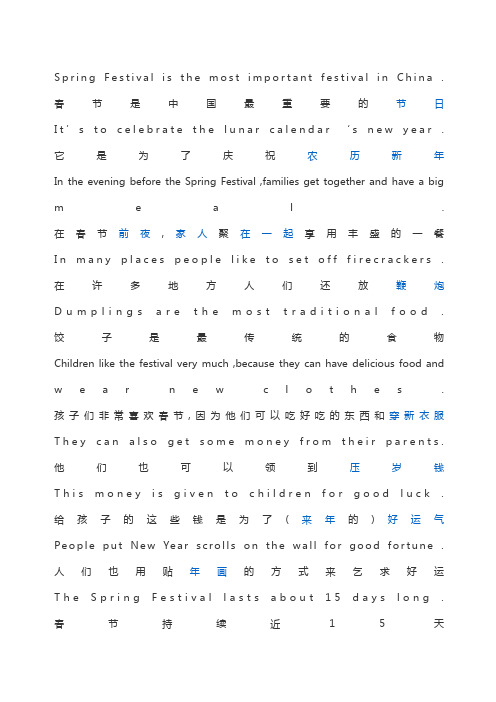
S p r i n g F e s t i v a l i s t h e m o s t i m p o r t a n t f e s t i v a l i n C h i n a. 春节是中国最重要的节日I t’s t o c e l e b r a t e t h e l u n a r c a l e n d a r‘s n e w y e a r. 它是为了庆祝农历新年In the evening before the Spring Festival ,families get together and have a big m e a l. 在春节前夜,家人聚在一起享用丰盛的一餐I n m a n y p l a c e s p e o p l e l i k e t o s e t o f f f i r e c r a c k e r s. 在许多地方人们还放鞭炮D u m p l i n g s a r e t h e m o s t t r a d i t i o n a l f o o d. 饺子是最传统的食物Children like the festival very much ,because they can have delicious food and w e a r n e w c l o t h e s. 孩子们非常喜欢春节,因为他们可以吃好吃的东西和穿新衣服T h e y c a n a l s o g e t s o m e m o n e y f r o m t h e i r p a r e n t s. 他们也可以领到压岁钱T h i s m o n e y i s g i v e n t o c h i l d r e n f o r g o o d l u c k. 给孩子的这些钱是为了(来年的)好运气Pe o p l e p u t N e w Ye a r s c r o l l s o n t h e w a l l f o r g o o d f o r t u n e. 人们也用贴年画的方式来乞求好运T h e S p r i n g F e s t i v a l l a s t s a b o u t15d a y s l o n g. 春节持续近15天People visit relatives and friends with the words “Have all your wishes ”. 人们拜访亲戚朋友时会送上一句"万事如意" People enjoy the Spring Festival ,during this time they can have a good rest . 人们享受春节,在这段时间他们可以好好休息一下The Spring Festival is the most important festival for the Chinese people and is when all family members get together, just like Christmas in the West. All people living away from home go back, becoming the busiest time for transportation systems of about half a month from the Spring Festival. Airports, railway stations and long-distance bus stations are crowded with home ret urnees.The Spring Festival falls on the 1st day of the 1st lunar month, often one month later than the Gregorian calendar. It originated in the Shang Dynasty (c. 1600 BC-c. 1100 BC) from the people’s sacrifice to gods and ancestors at the end of an old y e a r a n d t h e b e g i n n i n g o f a n e w o n e.Strictly speaking, the Spring Festival starts every year in the early days of the 12th lunar month and will last till the mid 1st lunar month of the next year. Of them, the most important days are Spring Festival Eve and the first three days. The Chinese government now stipulates people have seven days off for the Chinese Lunar New Y e a r.Many customs accompany the Spring Festival. Some are still followed today, but o t h e r s h a v e w e a k e n e d.On the 8th day of the 12th lunar month, many families make laba porridge, a delicious kind of porridge made with glutinous rice, millet, seeds of Job’s tears, j u j u b e b e r r i e s,l o t u s s e e d s,b e a n s,l o n g a n a n d g i n g k o.The 23rd day of the 12th lunar month is called Preliminary Eve. At this time, people offer sacrifice to the kitchen god. Now however, most families make d e l i c i o u s f o o d t o e n j o y t h e m s e l v e s.After the Preliminary Eve, people begin preparing for the coming New Year. This is c a l l e d"S e e i n g t h e N e w Y e a r i n".Store owners are busy then as everybody goes out to purchase necessities for the New Year. Materials not only include edible oil, rice, flour, chicken, duck, fish and meat, but also fruit, candies and kinds of nuts. What’s more, various decorations, new clothes and shoes for the children as well as gifts for the elderly, friends and r e l a t i v e s,a r e a l l o n t h e l i s t o f p u r c h a s i n g.Before the New Year comes, the people completely clean the indoors andoutdoors of their homes as well as their clothes, bedclothes and all their utensils.Then people begin decorating their clean rooms featuring an atmosphere of rejoicing and festivity. All the door panels will be pasted with Spring Festival couplets, highlighting Chinese calligraphy with black characters on red paper. The content varies from house owners’wishes for a bright future to good luck for the New Year. Also, pictures of the god of doors and wealth will be posted on front doors to ward off evil spirits and welcome peace and abundance.The Chinese character "fu" (meaning blessing or happiness) is a must. The character put on paper can be pasted normally or upside down, for in Chinese the "reversed fu" is homophonic with "fu comes", both being pronounced as "fudaole." What’s more, two big red lanterns can be raised on both sides of the front door. Red paper-cuttings can be seen on window glass and brightly colored New Year paintings with auspicious meanings may be put on the wall.People attach great importance to Spring Festival Eve. At that time, all family members eat dinner together. The meal is more luxurious than usual. Dishes such as chicken, fish and bean curd cannot be excluded, for in Chinese, their pronunciations, respectively "ji", "yu" and "doufu," mean auspiciousness, abundance and richness. After the dinner, the whole family will sit together, chatting and watching TV. In recent years, the Spring Festival party broadcast onChina Central Television Station (CCTV) is essential entertainment for the Chinese both at home and abroad. According to custom, each family will stay up to see the N e w Y e a r i n.Waking up on New Year, everybody dresses up. First they extend greetings to their parents. Then each child will get money as a New Year gift, wrapped up in red paper. People in northern China will eat jiaozi, or dumplings, for breakfast, as they think "jiaozi" in sound means "bidding farewell to the old and ushering in the new". Also, the shape of the dumpling is like gold ingot from ancient China. So p e o p l e e a t t h e m a n d w i s h f o r m o n e y a n d t r e a s u r e. Southern Chinese eat niangao (New Year cake made of glutinous rice flour) on this occasion, because as a homophone, niangao means "higher and higher, one year after another." The first five days after the Spring Festival are a good time for relatives, friends, and classmates as well as colleagues to exchange greetings, gifts a n d c h a t l e i s u r e l y.Burning fireworks was once the most typical custom on the Spring Festival. People thought the spluttering sound could help drive away evil spirits. However, such an activity was completely or partially forbidden in big cities once the government took security, noise and pollution factors into consideration. As a replacement, some buy tapes with firecracker sounds to listen to, some break little balloons to get the sound too, while others buy firecracker handicrafts to hang in the livingr o o m.The lively atmosphere not only fills every household, but permeates to streets and lanes. A series of activities such as lion dancing, dragon lantern dancing, lantern festivals and temple fairs will be held for days. The Spring Festival then comes to a n e n d w h e n t h e L a n t e r n F e s t i v a l i s f i n i s h e d.China has 56 ethnic groups. Minorities celebrate their Spring Festival almost the s a m e d a y a s th e H a n pe o pl e, an d t h e y h a ve d i f f e re n t c u s to m s。
SpringFestival春节英文介绍

击 此
节 处
添 加
英 副
标 题 内
文 容 汇 介报 人 :
绍
XXX
壹
添加目录标题
贰
春节的起源
目录
CONTENTS
叁
春节的传统习俗
肆
春节的文化内涵
伍
春节的庆祝活动
陆
春节的国际影响
添 加 文 档 标 题
春 节 的 起 源
春节的起源和历史
春节的起源可以追溯到古代中国的新年庆祝活动,已有数千年的历史。 春节是农历新年的第一天,也是中国最重要的传统节日之一。 春节的起源蕴含着丰富的文化内涵,与中国的传统文化、历史和习俗密切相关。 随着时间的推移,春节的庆祝方式也在不断演变,但仍然保留着许多传统的习俗和活动。
贴春联
起源:贴春联的习俗起源于古代的桃符,为了驱邪避凶,祈求吉祥。
内容:春联通常由对仗工整、韵律和谐的诗句组成,表达对幸福生活的美好祝愿。
形式:春联可以贴在门框上、门心上或墙壁上,根据不同的场合和用途有所区别。
意义:贴春联不仅是一种传统习俗,更是一种文化传承和表达方式,体现了中国人民的智慧 和创造的烟花表演、音乐 会和游行活动,以及品尝中国美食。
添加标题
添加标题
添加标题
添加标题
加拿大:春节在加拿大也日益受到 重视,人们会举行各种庆祝活动, 如舞龙舞狮、品尝中餐等。
澳大利亚:澳大利亚的春节庆祝活动 丰富多彩,包括龙狮表演、花市、灯 笼节等,同时还有各种中国传统文化 展示和体验活动。
春节的重要性
春节是中国最重要的传统节日之一,具有悠久的历史和文化底蕴。
春节象征着团圆、和谐和幸福,是家人团聚、亲情友情的时刻。
春节期间,人们会进行一系列的庆祝活动,如贴春联、放鞭炮、拜年等,这些活 动寓意着吉祥如意、幸福安康。 春节也是中国文化的代表之一,对于弘扬中华文化、促进中外文化交流具有重要 意义。
Spring festival 春节中英文介绍
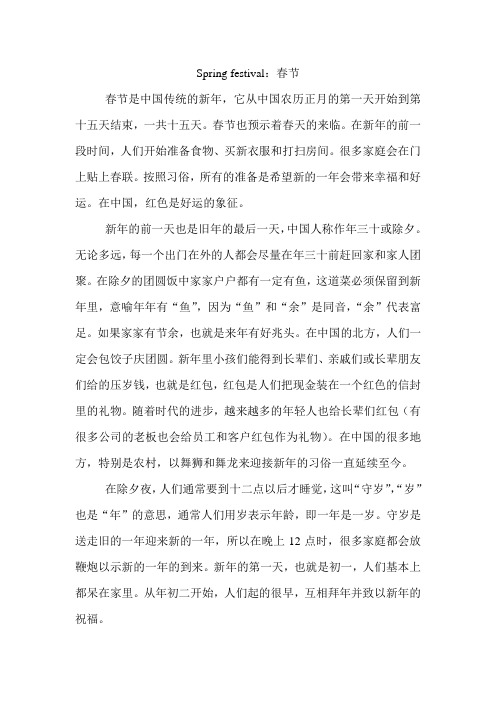
Spring festival:春节春节是中国传统的新年,它从中国农历正月的第一天开始到第十五天结束,一共十五天。
春节也预示着春天的来临。
在新年的前一段时间,人们开始准备食物、买新衣服和打扫房间。
很多家庭会在门上贴上春联。
按照习俗,所有的准备是希望新的一年会带来幸福和好运。
在中国,红色是好运的象征。
新年的前一天也是旧年的最后一天,中国人称作年三十或除夕。
无论多远,每一个出门在外的人都会尽量在年三十前赶回家和家人团聚。
在除夕的团圆饭中家家户户都有一定有鱼,这道菜必须保留到新年里,意喻年年有“鱼”,因为“鱼”和“余”是同音,“余”代表富足。
如果家家有节余,也就是来年有好兆头。
在中国的北方,人们一定会包饺子庆团圆。
新年里小孩们能得到长辈们、亲戚们或长辈朋友们给的压岁钱,也就是红包,红包是人们把现金装在一个红色的信封里的礼物。
随着时代的进步,越来越多的年轻人也给长辈们红包(有很多公司的老板也会给员工和客户红包作为礼物)。
在中国的很多地方,特别是农村,以舞狮和舞龙来迎接新年的习俗一直延续至今。
在除夕夜,人们通常要到十二点以后才睡觉,这叫“守岁”,“岁”也是“年”的意思,通常人们用岁表示年龄,即一年是一岁。
守岁是送走旧的一年迎来新的一年,所以在晚上12点时,很多家庭都会放鞭炮以示新的一年的到来。
新年的第一天,也就是初一,人们基本上都呆在家里。
从年初二开始,人们起的很早,互相拜年并致以新年的祝福。
Spring Festival is the Chinese New Year. It starts on the 1st and ends on the 15th of lunar January. Spring Festival celebrates the coming of spring. Several days before the New Year, every family prepares rich food, buys new clothes, and cleans the house. Many families buy or write Spring Festival couplets and put them on the door. People believe that everything must be new and clean for the Spring Festival celebration so that the New Year will bring happiness and good luck. In China, red represents luck.The celebration begins on the eve of the lunar New Year when the family gathers for dinner. No matter how far away from home people are, they will always try to get home in time for this big dinner, which lasts until midnight. For the dinner, every family cooks fish, and part or all of the fish is kept until the first day of the New Year. This represents the family being richer in the New Year, because in Chinese “fish” and “prosperous”are homonphones. In northern China, people cook dumplings for family reunion dinner. In the New Year, kids get “hïng bāo(red envelopes)” from older generations of the family and relatives, and sometimes family friends. The “hïng bāo”is a Chinese custom where people put cash in a red envelope and give it as a gift. In modern times, more and more young people give “hïngbāo” to older people. In many companies, the boss also gives “hïng bāo”to employees and clients. In many parts of China, especially the countryside, people do alion dance and dragon dance to welcome the coming New Year.On New Year’s eve, people set off fireworks from around midnight to see out the end of the previous year and welcome in the New Year, called “shǒusuì” .“suì”means year. On the first day of the New Year people usually stay at home. On the 2nd day people get up early and exchange New Year’s greetings with relatives, friends, neighbors, etc.Happy New Year!xīn nián kuài lè!新年快乐!Happy New Year!xīn nián hǎo !新年好!When in Rome do as the Romans do.rù xiāng suí sú.入乡随俗。
介绍中国春节 The Spring Festival

介绍中国春节 The Spring Festival近年来我国的发展世人瞩目,中国的传统文化正越来越受到各国朋友的关注。
请根据提示,以“The Spring Festival”为题写一篇短文,向外国朋友介绍我国的春节。
要求:1、字迹工整,规范;2、 80词左右;3、根据所给要点及参考词汇,可适当发挥。
①春节是中国农历年(the lunar year)的第一天;②春节前:一个月前开始准备(prepare)食物,打扫卫生,装饰(decorate)房子;③除夕(On Chinese N ew Year’s Eve):家人团员(get together), 吃年夜饭(big dinner),守夜(stay up till midnight), 放烟花鞭炮(play fireworks and crackers);④大年初一(the first day):穿新衣(put on new clothes),向父母拜年(greet parents),收压岁钱(get lucky money)The Spring FestivalIn China, the Spring festival is ______________________________________________介绍中国春节英语作文范文:The Spring FestivalIn China, the Spring festival is the first day of the lunar year. People usually start preparing for the festival one month before it comes. They prepare delicious food, and clean and decorate their homes. On Chinese New Year’s Eve, the family all get together for a big dinner. They stay up till midnight, and then play fireworks and crackers for good luck. On the first day of the lunar New Year, children put on their new clothes and greet their parents. They are very happy to get lucky money from them.。
spring festival(春节中、英版)

Happy spring festival
春节的意义: 春节的意义 春节首先是个亲人的节日、 春节首先是个亲人的节日、家庭的 节日, 节日,而人特别是中国人最看重家 庭和亲情。 庭和亲情。
The meaning of the spring festival: The first is the festival, families, and people, especially chinese value family and love the most .
But in private, nationalism in 但在民间, 但在民间,传统意义上的 the spring festival is the 春节是指从腊月初八的腊 eighth of december of 祭或腊月二十三或二十四 offering or december 23 and 的祭灶,一直到正月十五, 的祭灶,一直到正月十五, 24 of the kitchen to the 其中以除夕和正月初一为 fifteenth, with new year's eve 高潮。 高潮。 and the beginning to a climax. 在春节期间, 在春节期间,中国的汉族 和很多少数民族都要举行 各种活动以示庆祝。 各种活动以示庆祝。 In the spring festival, china's han and the many minority nationalities are conducted various activities to celebrate.
Happy spring festival
The end
Happy spring festival !
Happy spring festival
英语作文:Spring Festival 春节
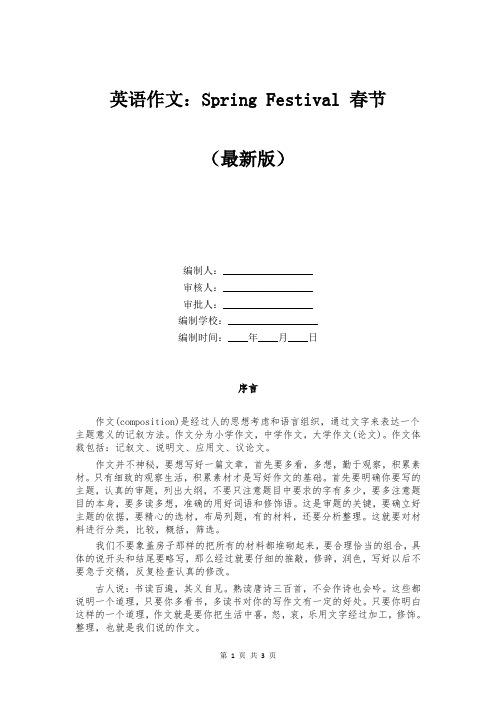
英语作文:Spring Festival 春节(最新版)编制人:__________________审核人:__________________审批人:__________________编制学校:__________________编制时间:____年____月____日序言作文(composition)是经过人的思想考虑和语言组织,通过文字来表达一个主题意义的记叙方法。
作文分为小学作文,中学作文,大学作文(论文)。
作文体裁包括:记叙文、说明文、应用文、议论文。
作文并不神秘,要想写好一篇文章,首先要多看,多想,勤于观察,积累素材。
只有细致的观察生活,积累素材才是写好作文的基础。
首先要明确你要写的主题,认真的审题,列出大纲,不要只注意题目中要求的字有多少,要多注意题目的本身,要多读多想,准确的用好词语和修饰语。
这是审题的关键,要确立好主题的依据,要精心的选材,布局列题,有的材料,还要分析整理。
这就要对材料进行分类,比较,概括,筛选。
我们不要象盖房子那样的把所有的材料都堆砌起来,要合理恰当的组合,具体的说开头和结尾要略写,那么经过就要仔细的推敲,修辞,润色,写好以后不要急于交稿,反复检查认真的修改。
古人说:书读百遍,其义自见。
熟读唐诗三百首,不会作诗也会吟。
这些都说明一个道理,只要你多看书,多读书对你的写作文有一定的好处。
只要你明白这样的一个道理,作文就是要你把生活中喜,怒,哀,乐用文字经过加工,修饰。
整理,也就是我们说的作文。
作文内容英语作文:Spring Festival 春节Last year’s Spring Festival is special. My uncle and my aunt came back from Shanghai. My family were very happy to keep the Spring Festival with them. And it was the most exciting festival of all the festivals.On New Year’s Eve, my father and my uncle talked about their work together. My mum did some cooking with my aunt Grandparents and I watched the New Year TV programmes. At about six o’clock, we had a special family dinner. We all thought the dumplings were delicious.On the first day of the New Year, we visited our relatives. In the afternoon, we went shopping in Jiefanf Road. My uncle bought some Jay’s CDs. He likes Jay’s music very much. There were so many people on the road. It was more alive than any other time of a year.On the second and the third days, we spent a wonderful weekend in the country. There were much bigger trees than in the city. And the animals were more beautiful than in the city. We all enjoyed ourselves.I had an interesting Spring Festival. How about you?去年的春节是特别的。
春节(Spring Festival)
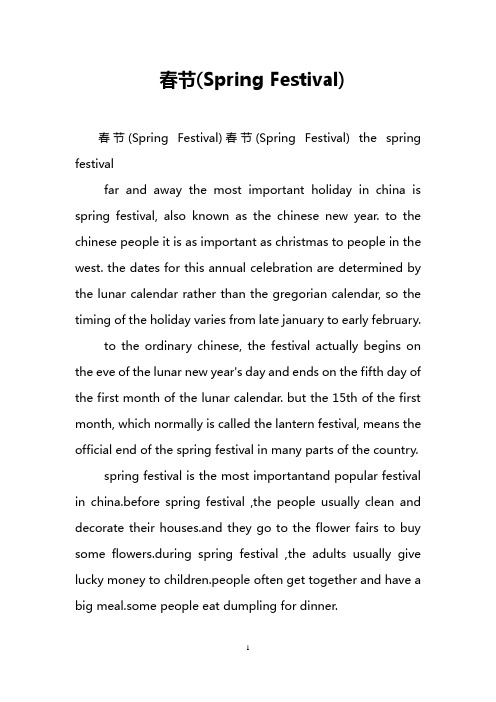
春节(Spring Festival)春节(Spring Festival)春节(Spring Festival) the spring festivalfar and away the most important holiday in china is spring festival, also known as the chinese new year. to the chinese people it is as important as christmas to people in the west. the dates for this annual celebration are determined by the lunar calendar rather than the gregorian calendar, so the timing of the holiday varies from late january to early february.to the ordinary chinese, the festival actually begins on the eve of the lunar new year's day and ends on the fifth day of the first month of the lunar calendar. but the 15th of the first month, which normally is called the lantern festival, means the official end of the spring festival in many parts of the country.spring festival is the most importantand popular festival in china.before spring festival ,the people usually clean and decorate their houses.and they go to the flower fairs to buy some flowers.during spring festival ,the adults usually give lucky money to children.people often get together and have a big meal.some people eat dumpling for dinner.i love spring festival .。
关于春节的英文。

关于春节的英文。
“春节”的英文常见的表达有“Spring Festival”或者“Chinese New Year”。
例如:
1、We celebrate the Spring Festival every year.(我们每年都庆祝春节。
)
2、The Chinese New Year is a time for family reunions.(春节是家人团聚的时刻。
)
在英文中,“Spring Festival”更强调节日的季节性,而“Chinese New Year”则更侧重于中国的新年
除了“Spring Festival”和“Chinese New Year”,还有一些其他常见的关于春节的英文表达方式,比如:
1.Lunar New Year:指农历新年,强调与农历历法相
关。
2.Festival of Spring:强调春天的节日。
3.New Year celebrations:表示新年的庆祝活动。
4.Spring Festival celebrations:指春节的庆祝仪
式。
5.The Spring Festival holiday:春节假期。
这些表达方式都可以用来描述春节这个重要的传统节日及其相关活动,仅供参考。
2022年春节的英语作文_Spring Festival 5篇

春节的英语作文_Spring Festival 5篇导读:关于”春节“的英语作文范文5篇,作文题目:Spring Festival。
以下是关于春节的初中英语范文,每篇作文均为万能范文带翻译。
关于”春节“的英语作文范文5篇,作文题目:Spring Festival。
以下是关于春节的初中英语范文,每篇作文均为万能范文带翻译。
高分英语作文1:Spring FestivalTherefore, it is important to stay up late in the new year's Eve to watch the beginning of the new year's Eve, to celebrate the new year in the sound of firecrackers, or to eat dumplings shortly after new year's day. It is an important traditional dumpling, also known as yuanxiao, which is a kind of Chinese food. Glutinous rice flour and a small amount of water are mixed into balls, and then cooked and eaten in boiling water.Traditionally, the balls are filled with sweet black sesame paste Although the stuffing is different, the main tradition of the Lantern Festival is to hang lanterns, which are hung in public places such as families, parks, streets and so on. The various red lanterns will attract countless tourists to watch.中文翻译:所以尘封年画守岁要熬夜或是在除夕夜通宵看旧年出头,在鞭炮声中拜年给人拜年,或在元旦后不久吃汤圆是元宵节的重要传统汤圆,又称元宵,是一种中餐用糯米粉和少量的水混合成丸子,然后煮熟后放入沸水中食用,传统上,丸子里塞满了甜的黑芝麻糊,元宵节吃汤圆虽然馅料不同,但由于谐音统一,元宵节的主要传统是挂灯笼,大大小小的灯笼挂在家庭、公园、街道等公共场所,形形的红灯笼会吸引无数的游客前来观赏。
(word完整版)Spring Festival(英文版春节介绍)

Spring Festival1.Tale of NianWe call the Spring Festival Nian, but did you know that Nian was once the name of a terrible, scary monster? A long time ago, the monster Nian lived in the mountains. It looked like an ugly dragon, and got angry easily.Nian ate animals. But in winter, it could not find food。
So it came to many villages and ate people. People were so afraid of Nian that they locked their doors before evening came during the winter。
One day, an old man came to a village. He told people there that Nian was afraid of three things—red color, fire and noise。
He told people to play drums and gongs (铜锣), make big fires and set off fireworks (放鞭炮) to make Nian go away.On a moonless, cold night, Nian went to the village again。
As soon as it opened its big mouth, people made loud noises and made fires。
- 1、下载文档前请自行甄别文档内容的完整性,平台不提供额外的编辑、内容补充、找答案等附加服务。
- 2、"仅部分预览"的文档,不可在线预览部分如存在完整性等问题,可反馈申请退款(可完整预览的文档不适用该条件!)。
- 3、如文档侵犯您的权益,请联系客服反馈,我们会尽快为您处理(人工客服工作时间:9:00-18:30)。
The song “Happy New Year ”in Chinese
happy new year, happy new year happy new year to you all we are singing, we are dancing, happy new year to you all 新 年 好 呀,
Chinese New year Decoration------especially positive couplets
Chinese New Year decoration
People hang red lanterns in front of their house. Office buildings and stores are also decorated with red lanterns. Bright red posters with black or golden Chinese calligraphy are placed on the doors of peoples' homes. They carry the New Year's messages of prosperity, health and good luck.
In south China, the favorite and most typical dishes were nian gao, sweet steamed glutinous rice pudding and zong zi (glutinous rice wrapped up in reed leaves), another popular delicacy.
Happy new year • 新 年 快 • Xīn nián kuài
乐 lè
Congratulations and be prosperous • 恭 喜 发 财 • Gōng xǐ fā cái
• everlasting peace year after year • 岁 岁 平 安 • Suì suì píng'ān • a wish for surpluses and bountiful harvests every year • 年 年 有 余 • Nián nián yǒu yú
Chinese New year Decoration------especially positive couplets
Chinese New year Decoration------especially positive couplets
Decoration---Red banners with "Luck" (福) written on them are hung around the house and on the fronts of doors.
Firecrackers on New Year's Eve---Bringing In the New Year and Expelling the Old
Shooting off firecrackers on New Year's Eve is the Chinese way of sending out the old year and welcoming in the New Year. On the stroke of midnight on New Year's Eve, every door in the house, and even windows, have to be open to allow the old year to go out.
Spring Festival Legend
What is the Chinese New Year color?
What do Chinese people do to celebrate Spring Festival?
Spring Festival Legend
Once upon a time, there was a huge, savage animal that lived under the sea, whose name was "Nian". Every Spring, Nian needed to replenish his larder. He jumped out of the water and attacked villages, eating everything he saw: people, animals and plants. Over years, the people tried to protect themselves from Nian. One spring, Villagers hung bright red paper on every door in the village and as soon as Nian entered the village, they threw bamboo into the fire, which gave out thousands of explosions. Nian suddenly ran away as fast as his legs could carry him. Since then, every year around this time, people hung red paper and burned bamboo to protect themselves from Nian. This practiceon of Spring Festival, where people hang red posters (paper) and light firecrackers (originally made from bamboo).
In the north, steamed-wheat bread (man tou) and small meat dumplings were the preferred food. The tremendous amount of food prepared at this time was meant to symbolize abundance and wealth for the household.
•Fresh bean curd or tofu is not included as it is white and unlucky for New Year as the color signifies death and misfortune.
Traditional New Year Foods---dumplings
• Most Northerners serve dumplings as the main dish on this festive season, although most Chinese around the world would do the same because it is believed that dumplings (饺子--jiǎo zi) 饺子 is wrapped in the semblance of Chinese gold nuggets used in ancient China. This gold nugget is called 金元宝 (jin yuán bǎo).
Chinese New Year ‘s Greeting---The Chinese New Year is often accompanied by loud, enthusiastic greetings, often referred to as 吉祥話 (Jí xiánghùa), or loosely translated as auspicious words or phrases. Some of the most common examples may include:
Other foods include a whole fish, to represent togetherness and abundance,and a chicken for prosperity. The chicken must be presented with a head, tail and feet to symbolize completeness. Noodles should be uncut, as they represent long life.
新 年 好 呀, 祝 贺 大 家 新 年 好.
我 们 唱 歌,我 们 跳舞,
祝 贺 大 家 新 年 好.
Traditional New Year Foods
On New Year's Day, the Chinese family will eat a vegetarian dish called jai. Although the various ingredients in jai are root vegetables or fibrous vegetables, many people attribute various superstitious aspects to them. •Lotus seed - signify having many male offspring •Ginkgo nut - represents silver ingots •Black moss seaweed - is a homonym for exceeding in wealth •Dried bean curd is another homonym for fulfillment of wealth and happiness •Bamboo shoots - is a term which sounds like "wishing that everything would be well”
